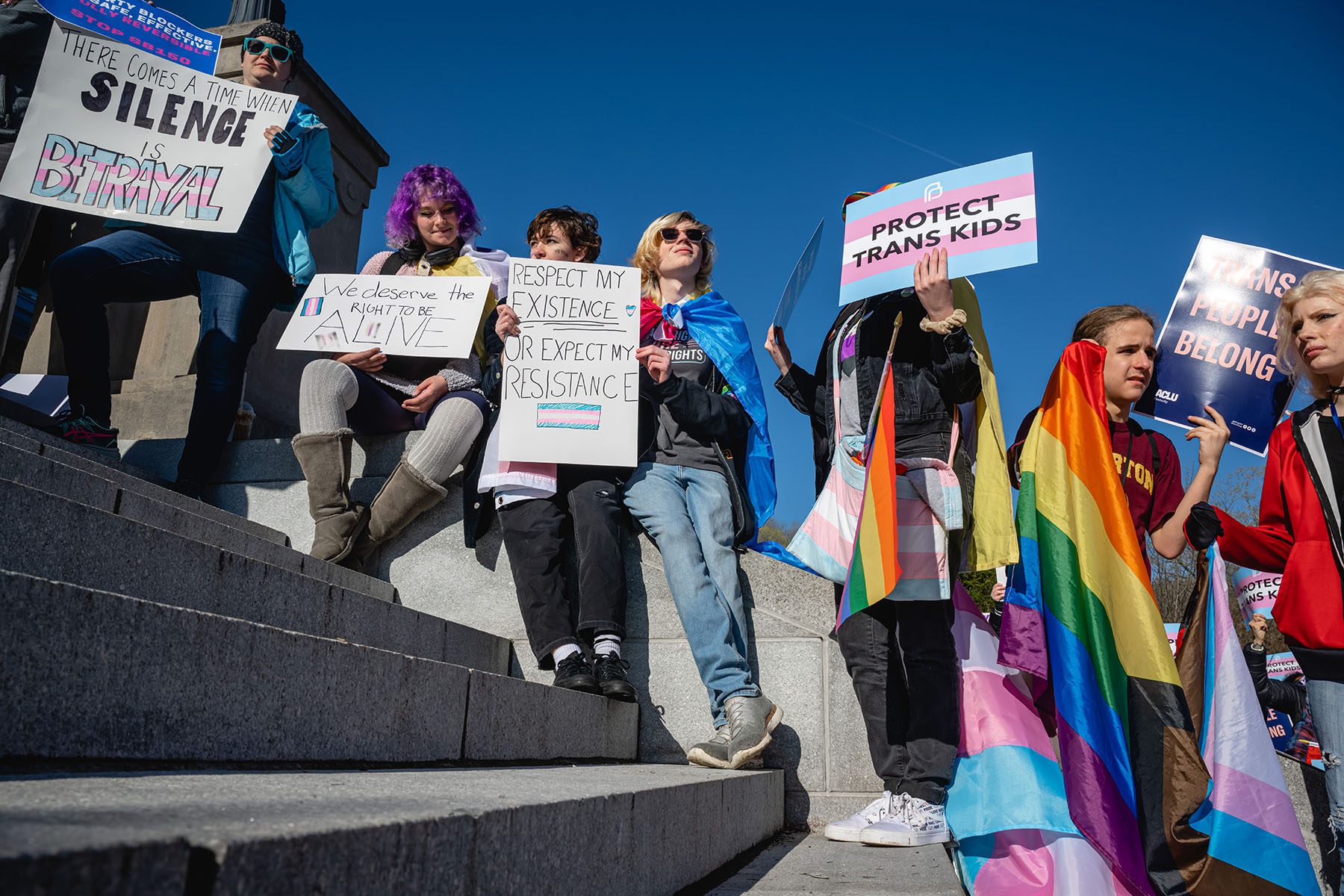Your trusted source for contextualizing the news. Sign up for our daily newsletter.
The Department of Education on Thursday formally proposed a rule change to Title IX, the federal civil rights law prohibiting sex discrimination in schools, that would be at odds with anti-trans bills being signed into law and introduced in statehouses across the country.
The rule change would establish that categorical bans against transgender students joining sports teams that align with their gender identity violates Title IX. However, the proposed rule allows for competitive high school and college sports to restrict trans students’ participation if those schools follow guidelines laid out by the agency — particularly, to minimize harm for excluded students.
Currently, 20 states have passed legislation to ban trans students, especially transgender girls, from participating in sports that are consistent with their gender identity, according to the Movement Advancement Project, which tracks LGBTQ+ policy. Enforcement of multiple bans has been blocked in court through temporary injunctions.
The Education Department said in a news release that it expects that limiting transgender students’ participation in school sports at the high school and college level may be permitted in some cases, “when they enable the school to achieve an important educational objective, such as fairness in competition” and meet other agency requirements.
When schools create policies on trans students’ participation, they must minimize harm to the students and take into account the participation criteria of sport-governing bodies. School policies restricting trans students’ sports access must also take into account whether the sport is high or low competition. If a team is open to all students regardless of athletic ability or is for students in younger grades and more focused on teamwork and fitness than competitive success, the Education Department suggests, trans students should not be excluded.
-
More from The 19th
- Exclusive: Trans students and their parents ask Education Department leaders to help them fight anti-LGBTQ+ bills
- Education Department reinforces Title IX protections for abortion and pregnancy
- Proposed Title IX changes would provide unprecedented protection for LGBTQ+ students and sexual assault survivors
The public will be able to comment on the proposed rule, which would apply to public K-12 schools and colleges that receive federal funding, for 30 days from the date of the rule’s publication in the Federal Register. A senior department official, who spoke to reporters on condition of anonymity ahead of the release of the rule, told reporters Thursday that she expects that publication to happen within the next few weeks.
The agency has a variety of tools to enforce and investigate Title IX violations, the official said — including evaluating records and interviewing school community members. Typically, schools choose to come into compliance when they violate Title IX, she said. But, in the unlikely scenario that a school declines to come into compliance with the law, the agency is willing and able to withhold federal funds.
Thursday’s proposed rule follows a meeting last week between transgender students and their parents and top officials at the Education Department — during which families of trans youth said they feel like they are being targeted by their state governments. It also comes after the Education Department last year proposed Title IX rule changes that bar discrimination on the basis of sexual orientation or gender identity.
The Education Department’s proposed changes to Title IX came as the Supreme Court on Thursday issued a temporary order to allow a 12-year-old transgender girl to keep her spot on her middle school track team in West Virginia pending an appeal in her case.
“Every student should be able to have the full experience of attending school in America, including participating in athletics, free from discrimination. Being on a sports team is an important part of the school experience for students of all ages,” U.S. Secretary of Education Miguel Cardona said in a statement ahead of Thursday’s proposed rule announcement.
While some LGBTQ+ legal organizations praised the Title IX proposals, others, including prominent activists, were cautious or criticized them.
The National Center for Lesbian Rights and GLBTQ Legal Advocates & Defenders (GLAD), organizations involved in various lawsuits against anti-LGBTQ+ policies that have gone into effect across the country, praised the agency’s announcement on Thursday.
“The proposed rule prohibits the kind of categorical bans adopted in too many states that are hurting transgender students and that send a dangerous message to all students,” Jennifer Levi, senior director of transgender and queer rights at GLAD, said in a statement. “It also allows schools to adopt reasonable policies for inclusion of transgender athletes that take into account differences between sports and across levels of competition.”
Prominent trans rights activists — Erin Reed, a legislative analyst who tracks anti-LGBTQ+ bills, and Alejandra Caraballo, a clinical instructor at the Cyber Law Clinic at Harvard Law School — denounced the proposed Title IX rule on Twitter and admonished the Biden administration, arguing that the vagueness of the rule can easily be used by conservatives to push more sports bans.
In Congress, a caucus of openly LGBTQ+ members of the House of Representatives said in a statement that although the rule “properly affirms that categorical bans that deny trans kids the opportunities to participate in school sports and learn these values violate Title IX,” the group plans to further analyze the rule and what restrictions it may still permit.
Republicans leading the Education and Workforce House Committee, which advanced legislation to implement a national ban on transgender girls joining school sports that match their gender identity, condemned the proposal.
Lambda Legal, through senior attorney and director of the group’s nonbinary and transgender rights project Sasha Buchert, said in a statement that the proposed rule “shows why 100% of the state bans are invalid,” but questioned whether it can be effective in eliminating the discrimination that transgender students face.
“These students must have full and equal chances to participate,” Buchert said.






